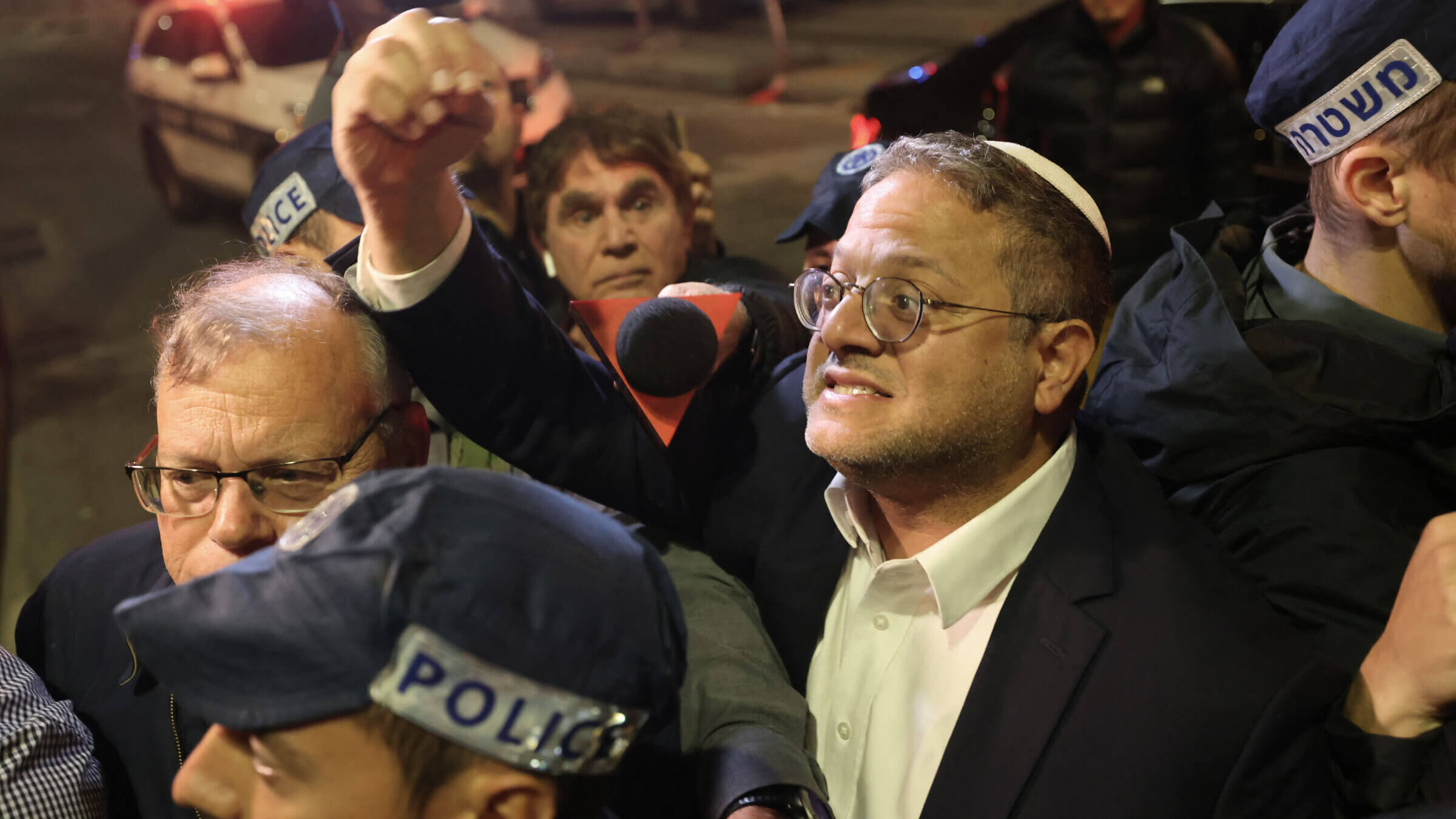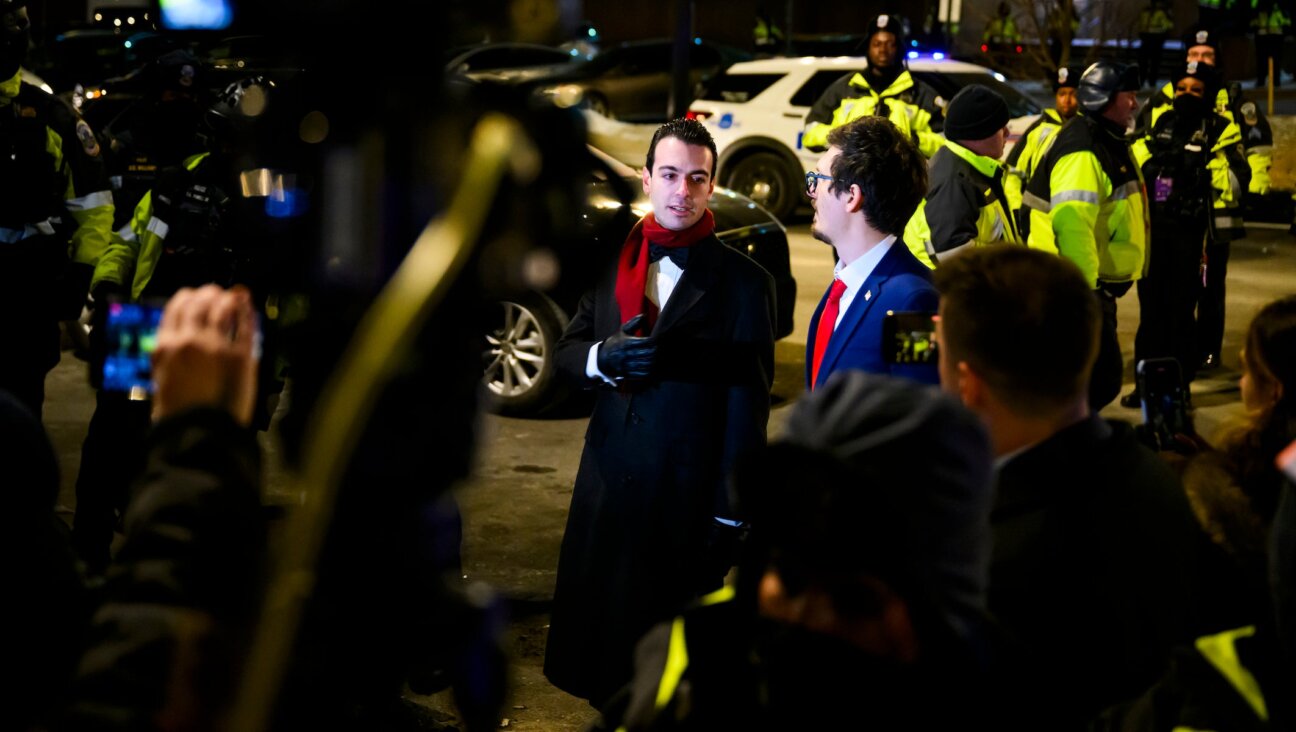At unusual counterprotest, right-wing demonstrators air grievances against Israel’s courts
“This is not just about the reform,” said one protester. ‘It is about control of the country, about whether the right can rule’

Israeli Minister of National Security Itamar Ben-Gvir speaks to bystanders as he walks to the site of a reported attack in a settler neighborhood in Israeli-annexed East Jerusalem on Jan. 27, 2023. Photo by AHMAD GHARABLI/AFP via Getty Images
JERUSALEM (JTA) — After three months of demonstrations dominated by detractors of Prime Minister Benjamin Netanyahu’s judicial overhaul plan, supporters of the proposed reform took to the streets Monday, making their voice heard in Jerusalem and across Israel.
Gathered outside the Knesset, Israel’s parliament, thousands of pro-reform protesters, including settlers bused in from the West Bank, sought to back Netanyahu and Justice Minister Yariv Levin, even as the prime minister announced his intention to temporarily suspend the plan.
“We are trying to create counter-pressure to the demonstrations of the left,” said Yisrael Entman, who lives in the Kokhav HaShahar settlement and was accompanied by his wife and five children.
It was the first major demonstration by supporters of the Netanyahu government’s now-paused legislation to overhaul the country’s judiciary to sap the independence and power of the Supreme Court. Both proponents and critics of the legislation say it would benefit Israel’s right, which largely believes that the courts are out of step with mainstream sentiment. They also share the view that the dispute is not just about how Supreme Court justices are appointed but about what values will prevail in Israel.
“Israel cannot have a liberal approach devoid of Judaism,” Entman said. “If you destroy the Jewish character of Israel we have no justification for being here.”
He and others at the rally offered a laundry list of grievances against the court, including the way it has deployed the 1992 Basic Law on Human Freedom and Dignity, which the court has at times used to combat discrimination against minorities.
Entman repeated the claim that the court had used the law to prevent the expulsion of African asylum seekers despite complaints from Israeli residents of south Tel Aviv. In fact, the court only limited the government’s ability to lock up asylum seekers in a Negev facility. It was Netanyahu who brokered a third-country expulsion agreement only to backtrack on it the next day.
Entman’s wife said bitterly that the court had “expelled settlers,” an apparent reference to court-ordered evacuation of Jewish settlers trespassing on private Palestinian property.
The massive demonstrations from right and left marked the culmination of a dramatic day in Israeli history, following Netanyahu’s firing of Defense Minister Yoav Galant after Galant urged a delay on the divisive judicial reform legislation, citing concerns about national security. The firing triggered an outpouring of public rage and ultimately led Netanyahu, for the first time since retaking office in December, to offer a compromise, promising to suspend legislation for several months and enter talks with opposition leaders.
The larger demonstrations were by critics of the government. But pro-reform organizers said more than 100,000 people attended demonstrations Monday across the country. In Jerusalem, more than a dozen cabinet ministers and Knesset members from coalition parties attended the rally, including Itamar Ben-Gvir, the head of the far-right Jewish Power party, and Bezalel Smotrich, leader of the Religious Zionism party. The men were reportedly among the last holdouts opposing the legislative pause, and each addressed the crowd.
The pro-government protests drew members of La Familia, a famously racist group of fans of the Beitar Jerusalem soccer club, alongside other right-wing activists. After the protest ended, several demonstrators made their way to Jerusalem’s Sacher Park where they clashed with police forces. In another incident in Jerusalem, protesters identifying as supporters of the judicial reform attacked an Arab taxi driver, injuring him and damaging his car.
A theme of the pro-government protest was that efforts to oppose the judicial reform legislation represent a form of election denial, a critique that government lawmakers had advanced, citing their majority after last November’s election. One man wore an Israeli flag as a cape and held up a sign that read, ”They are stealing the election.”
Yehiel Zadok, an 18-year-old from the Har Bracha settlement, who voted for Netanyahu’s Likud party, said, “The left lost the election and it’s time [for them] to admit it.” He argued that the battle over Supreme Court appointments is no more than an effort by the left to deny the right its ability to rule the country.
Zadok, who said he plans to study in a yeshiva before joining a military combat unit, offered a long list of grievances against the Supreme Court. “It harms settlement, ties the hands of the army and takes power that doesn’t belong to it.”
And while Zadok expressed support for Netanyahu’s decision to suspend the legislative drive and to enable dialogue, he warned that if the prime minister drops the plan altogether, he, for one, will abandon Likud in the next election and vote for Ben-Gvir’s Jewish Power party.
“Netanyahu needs to know that he is indebted to a huge number of people who voted for him and the reform,” said Zadok.
His friend, Yaakov Klein, who is also 18, said he was there not only to show support for the proposed judicial overhaul, but also for a greater cause.
“This is not just about the reform,” said Klein. “It is about control of the country, about whether the right can rule.” Like many other supporters of Netanyahu’s government, he feels sidelined in a society which, he claims, is dominated by the left.
“The left held on to centers of power like the army and the Histadrut,” he said, referring to Israel’s largest labor union, which joined a call for a general strike to protest the government on Monday. “Something has been exposed by the left’s protests: that when you take a little bit of cheese away from them, they burn down everything.
“The media,” Klein added, ”isn’t presenting the truth. It doesn’t show the other side.”
This article originally appeared on JTA.org.
























